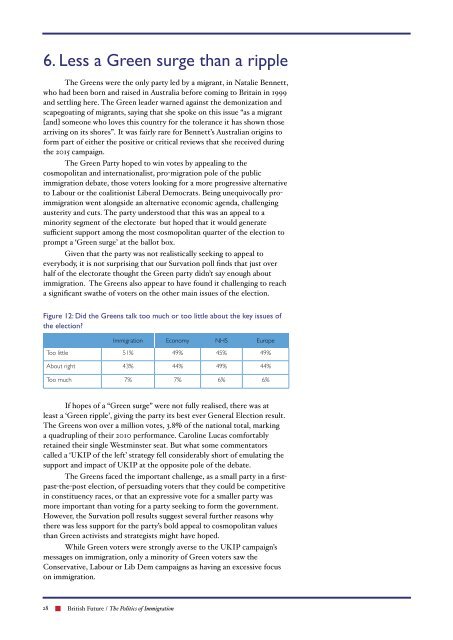THE POLITICS OF IMMIGRATION
The-politics-of-immigration
The-politics-of-immigration
You also want an ePaper? Increase the reach of your titles
YUMPU automatically turns print PDFs into web optimized ePapers that Google loves.
6. Less a Green surge than a ripple<br />
The Greens were the only party led by a migrant, in Natalie Bennett,<br />
who had been born and raised in Australia before coming to Britain in 1999<br />
and settling here. The Green leader warned against the demonization and<br />
scapegoating of migrants, saying that she spoke on this issue “as a migrant<br />
[and] someone who loves this country for the tolerance it has shown those<br />
arriving on its shores”. It was fairly rare for Bennett’s Australian origins to<br />
form part of either the positive or critical reviews that she received during<br />
the 2015 campaign.<br />
The Green Party hoped to win votes by appealing to the<br />
cosmopolitan and internationalist, pro-migration pole of the public<br />
immigration debate, those voters looking for a more progressive alternative<br />
to Labour or the coalitionist Liberal Democrats. Being unequivocally proimmigration<br />
went alongside an alternative economic agenda, challenging<br />
austerity and cuts. The party understood that this was an appeal to a<br />
minority segment of the electorate but hoped that it would generate<br />
sufficient support among the most cosmopolitan quarter of the election to<br />
prompt a ‘Green surge’ at the ballot box.<br />
Given that the party was not realistically seeking to appeal to<br />
everybody, it is not surprising that our Survation poll finds that just over<br />
half of the electorate thought the Green party didn’t say enough about<br />
immigration. The Greens also appear to have found it challenging to reach<br />
a significant swathe of voters on the other main issues of the election.<br />
Figure 12: Did the Greens talk too much or too little about the key issues of<br />
the election?<br />
Immigration Economy NHS Europe<br />
Too little 51% 49% 45% 49%<br />
About right 43% 44% 49% 44%<br />
Too much 7% 7% 6% 6%<br />
If hopes of a “Green surge” were not fully realised, there was at<br />
least a ‘Green ripple’, giving the party its best ever General Election result.<br />
The Greens won over a million votes, 3.8% of the national total, marking<br />
a quadrupling of their 2010 performance. Caroline Lucas comfortably<br />
retained their single Westminster seat. But what some commentators<br />
called a ‘UKIP of the left’ strategy fell considerably short of emulating the<br />
support and impact of UKIP at the opposite pole of the debate.<br />
The Greens faced the important challenge, as a small party in a firstpast-the-post<br />
election, of persuading voters that they could be competitive<br />
in constituency races, or that an expressive vote for a smaller party was<br />
more important than voting for a party seeking to form the government.<br />
However, the Survation poll results suggest several further reasons why<br />
there was less support for the party’s bold appeal to cosmopolitan values<br />
than Green activists and strategists might have hoped.<br />
While Green voters were strongly averse to the UKIP campaign’s<br />
messages on immigration, only a minority of Green voters saw the<br />
Conservative, Labour or Lib Dem campaigns as having an excessive focus<br />
on immigration.<br />
28 British Future / The Politics of Immigration


